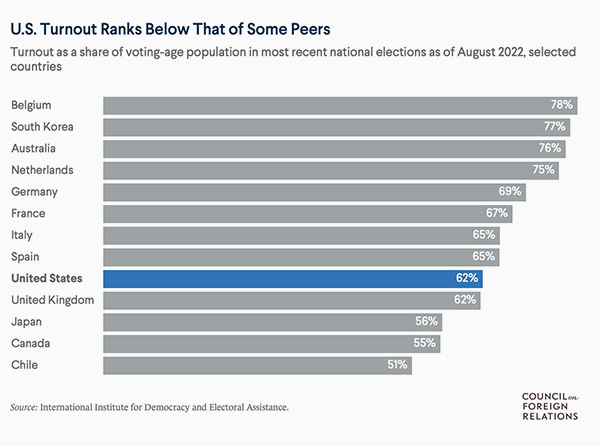

Republican state legislatures are always on the lookout for new and exciting ways to disenfranchise Democrats. One popular target is poor people who don't have drivers' licenses, or passports, let alone Global Entry cards, all of which cost money. But some states are now going after another group that skews heavily Democratic—college students—with mixed results.
This group is important because their turnout has surged in recent elections. Specifically, some states are trying to prevent college students who are going to school in a state other than where their parents live from voting where their college is. Fundamentally, they are counting on students being unable to figure out how to register and get an absentee ballot in their parents' state, thus leaving them disenfranchised. But that's only one way to do it. There are others.
One example of a success story for Republicans is Idaho, where the state legislature just forbade students from using their student ID cards—even those issued by state universities—as voter ID cards. Many students do not have a driver's license, passport, or other ID, so, presto!—they can't vote unless they figure out how to get some other valid ID. However, Idaho is in the minority. Of the 17 states that require government-issued photo ID, only four others—North Dakota, Ohio, South Carolina, and Tennessee—do not accept student ID cards. The other 12 accept ID cards from state universities. Arizona and Wisconsin have rigid rules on student ID cards, but colleges there are trying to meet them.
Other states have not been as successful for Republicans. Attempts to keep out-of-state students voting in New Hampshire and Virginia have failed. So has banning the pre-registration of 17-year-olds. But Republicans are keeping at it. New Hampshire is an interesting case in point. A bill was introduced that required college students to show an in-state tuition receipt to vote failed because Dartmouth and other private colleges don't issue them. All students pay the same tuition, regardless of where they live. Disenfranchising students who actually come from New Hampshire and attend the state's most prestigious university didn't fly.
Another state where the legislature tried to make it hard for students to vote is Texas (naturally). Texas has a vast network of universities and except for the UT Austin campus, nearly all students are from in state. So a clever Republican legislator introduced a bill to ban all polling places on university campuses? Why? Because we have the power to do so. The bill is still in committee and might not pass. If it does, it is sure to be challenged in court.
In Virginia, an effort to repeal a state law that allows teenagers to pre-register if they will be old enough to vote in the next general election failed. It died in committee. In Wyoming, a bill that enumerated what was a valid ID left out student IDs, but also left out Medicare and Medicaid cards. That one died because it would have hit seniors, who skew Republican. But it is sure to come up next year, this time including Medicare and Medicaid cards but leaving out student ID cards.
Georgia legislators were smarter. They allowed student IDs—but only from public universities. This means students at historically Black colleges and universities (which are mostly private) need some other form of ID. In Ohio, a new law just passed that banned the use of utility bills and university account statements, which used to be valid. So the battle goes on. Wherever Republicans see an opportunity to keep college students from voting, they almost always try.
In other countries, none of these shenanigans exist. People who are in principle eligible to vote nearly always can vote. This is one of the reasons that turnout of the voting-age population in the U.S. is middling. Here is a comparison with other wealthy countries:

Part of the reason is that partisan officials in the U.S. try to depress turnout, but there are other reasons as well. One of them is that in systems with proportional representation, the difference between your party getting 21% or 22% can mean an extra seat in the parliament. In a first-past-the-post system, like in the U.S., Democrats in Idaho and Republicans in Oregon may be thinking: "Why should I vote since it doesn't matter if we get 41% or 42% of the vote?" (V)